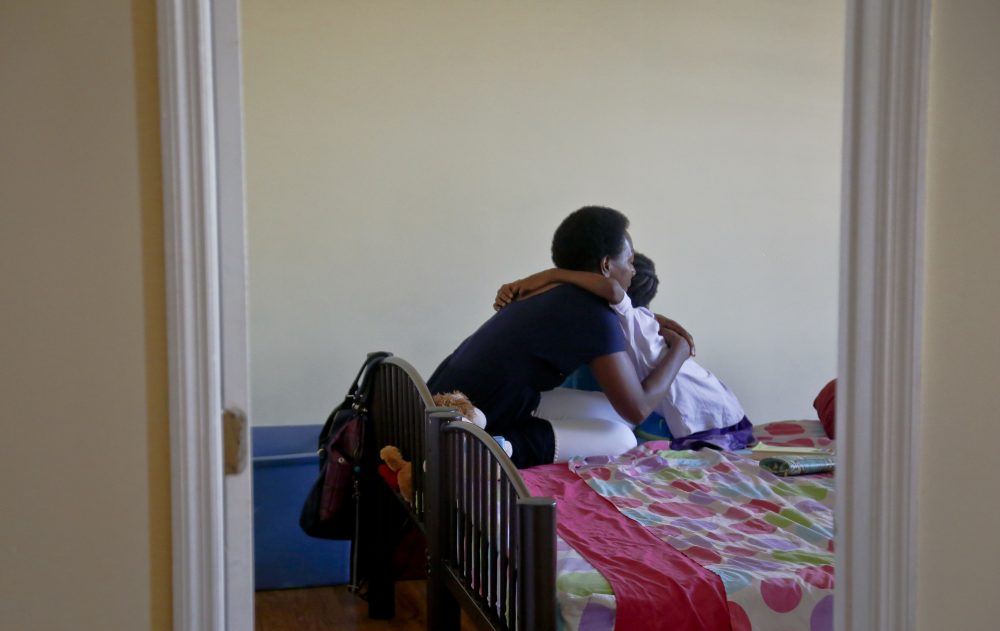Advertisement
Commentary
Doctor: Boston Evictions Tantamount To A Public Health Crisis

At 11 p.m. on a chilly night last November, a mother walked into our East Boston emergency department with her 2-year-old and 6-year-old. She had come home from work to find her front door taped over with "CAUTION" tape and a generic sign warning that her family had been evicted.
The doctor working that night, a seasoned ER veteran, told me he called the emergency department at the Boston Medical Center, where the social workers said they see a few similar cases each week. He eventually paid for the family’s hotel room that night himself. “You see a 2-year-old looking up at you, and even I feel something,” he said with a shrug.
A couple of weeks later, I had a similar encounter myself. The nurse handed me an EKG for a 14-year-old girl with palpitations and nausea. She had opened her front door and been startled to find a crew of workers painting their apartment. The landlady had not notified them about the work crew and the family initially thought it was a break-in.
The girl’s father explained that week after week, the landlady had been asking them to move out so she could sell the building. "We pay our rent every month, on time, but it’s hard to save enough money to put together first and last months' rent and a security deposit for a new apartment,” he told me. I could see the anxiety in the girl’s eyes as she looked to her father for reassurance that they would not soon be homeless.
Unfortunately, thousands of residents in East Boston and across the city are in similar situations. The true number of evictions in Boston is unknown, according to city officials, because the majority of evicted tenants never go to housing court.
But our hospital encounters suggest some of the impact. From last November through January, 44 homeless families walked into the emergency department of Boston Medical Center; last summer, the department saw between 40 and 50 homeless children per month. In February 2017 alone, the East Boston Neighborhood Health Center made 30 referrals for tenants fearing eviction to a local housing organization.
With nearly 4,000 homeless families across the state and almost 4,000 homeless children in Boston Public Schools, the local eviction crisis is tantamount to a child health and public health crisis.
Evictions can lead to many health problems. According to a nationally representative study published by Harvard and Rice University researchers, evicted mothers are more likely to have depression and report worse health for themselves and their children. Disruptive life events like eviction and homelessness at a young age may have lifelong health impacts for developing children.
A caregiver’s ability to make children feel safe and cared for is fundamental to healthy child development, which can be difficult for parents scrambling to keep a roof over their family's heads. Nearly 4,000 families are already homeless across the state and there are almost 4,000 homeless children in Boston Public Schools. In that context, the local eviction crisis is tantamount to a child health and public health crisis.
The two families that walked into our ER are only the tip of the iceberg. In 2016, Boston was the No. 1 big city in income inequality in the entire country. Rising rents and property values make it even more difficult for an average family to live near where they work. A household needs to earn an estimated $120,900 annually to comfortably afford a median-priced, 2-bedroom apartment in Boston. With rents like that, you have to start wondering, who is this city for?
The diagnosis is clear: The eviction crisis is an illness, and placing developers' profit over the well-being of Boston residents is the root cause.
The remedy? We have to provide protections for tenants and increase the amount of affordable housing in Boston. The Jim Brooks Community Stabilization Act, which was heard before the Boston City Council on March 6, would take modest, but important steps.
The measure would protect families like the ones I saw in the ER by requiring landlords to notify the city when they begin any eviction process and to give a reason for the eviction. This would allow the city to inform tenants of their rights and help resolve potential disputes. Simply mailing tenants a list of their rights, as some Boston city councilors suggested at the March 6 public hearing, is insufficient. That would be like a doctor sending a mailing to Boston residents about healthy diets and exercise and expecting it to result in a healthy city.
A caregiver’s ability make children feel safe and cared for is fundamental to healthy child development, which can be difficult for parents scrambling to keep a roof over their families’ heads.
Working families, marginalized communities and immigrants are often afraid to ask for their rights and need support. The Jim Brooks act is not “rent control.” It doesn’t limit rent increases. It specifically allows landlords to evict tenants who reject a formal offer of rent increase and would not affect landlords who own fewer than seven properties in Boston.
It is possible that speculators will respond to the ordinance with large rent increases, and for this reason notifying the city of evictions within two days and tenants of their rights within five days of the eviction notice are critical parts of the measure.
We are already witnessing the negative health impacts of displacement in our communities, our health centers and hospitals. As the eviction crisis grows, we must urge city officials to intervene to protect the health of Boston’s children and families and to preserve Boston for everyone.
Dr. Lara Jirmanus is a family physician at Cambridge Health Alliance and the East Boston Neighborhood Health Center and a fellow at the Harvard FXB Center for Health and Human Rights.